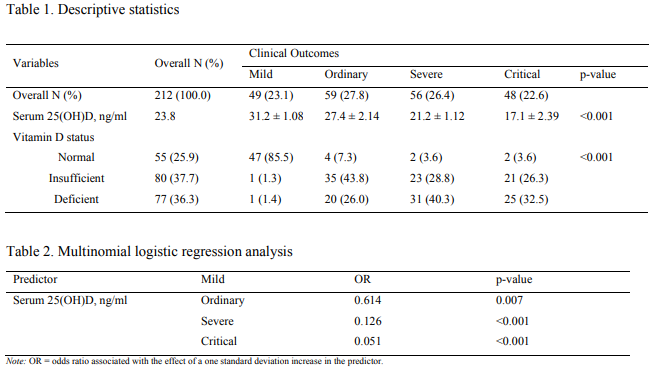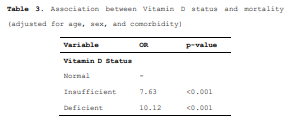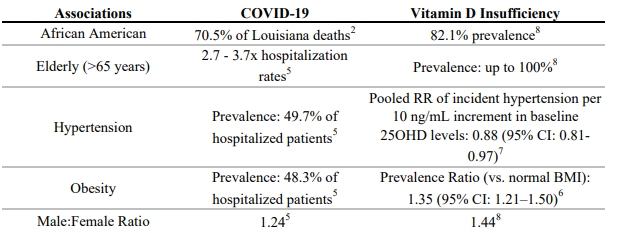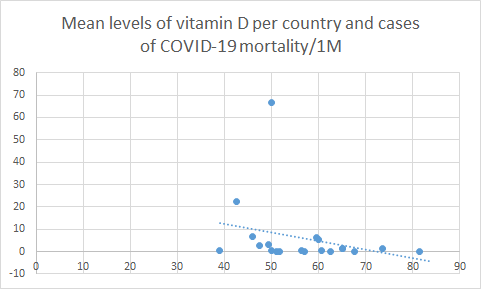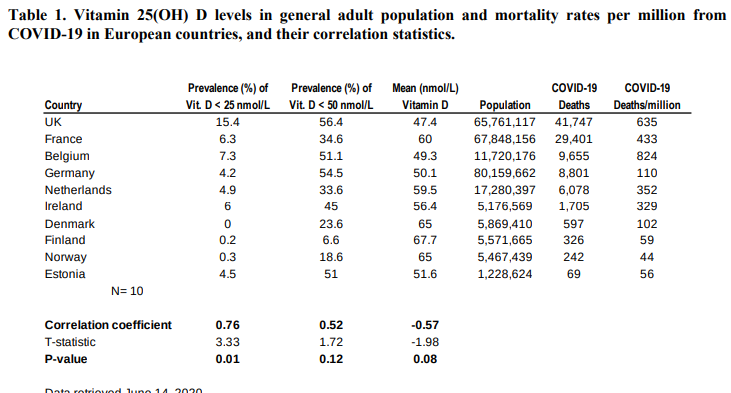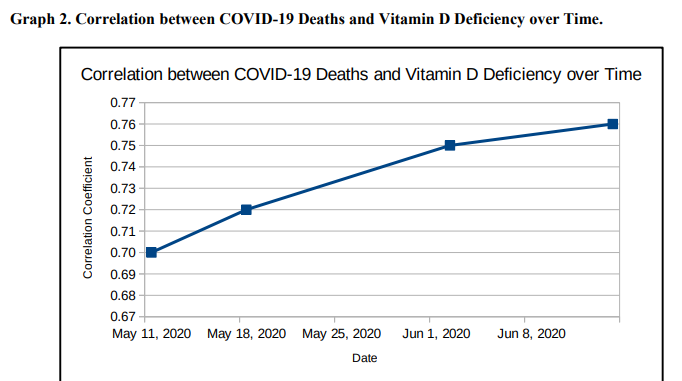There are now several clinical trials of vitamin D supplementation for COVID.
Recruiting now: multi-center trial in France, for age > 75.
High dose (200,000 IU) vs. standard dose (50,000 IU). https://clinicaltrials.gov/ct2/show/NCT04344041
High dose (200,000 IU) vs. standard dose (50,000 IU). https://clinicaltrials.gov/ct2/show/NCT04344041
Spain. RCT. Age 40-70, mildly symptomatic.
Standard care vs. 25000 UI of vitamin D supplement "taken in the morning together with a toast with olive oil to facilitate its absorption." https://clinicaltrials.gov/ct2/show/NCT04334005
Standard care vs. 25000 UI of vitamin D supplement "taken in the morning together with a toast with olive oil to facilitate its absorption." https://clinicaltrials.gov/ct2/show/NCT04334005
USA. Louisiana State University. RCT. Age 18+, new (within 24 hours) COVID-19 diagnosis
Aspirin 81 mg to be taken orally once daily for 14 days.
vs.
Asprin + Vitamin D 50,000 IU to be taken orally once weekly for 2 weeks https://clinicaltrials.gov/ct2/show/NCT04363840
Aspirin 81 mg to be taken orally once daily for 14 days.
vs.
Asprin + Vitamin D 50,000 IU to be taken orally once weekly for 2 weeks https://clinicaltrials.gov/ct2/show/NCT04363840
Another one in France. Lille Hospital. Institutionalized, Age 60+
They want 3140 participants.
Zinc + D3 vs. no intervention https://clinicaltrials.gov/ct2/show/NCT04351490
They want 3140 participants.
Zinc + D3 vs. no intervention https://clinicaltrials.gov/ct2/show/NCT04351490
And there's this one in California.
Hydroxychloroquine + Vitamin C + Vitamin D + Zinc prophylaxis. https://clinicaltrials.gov/ct2/show/NCT04335084
Hydroxychloroquine + Vitamin C + Vitamin D + Zinc prophylaxis. https://clinicaltrials.gov/ct2/show/NCT04335084
The increasing interest in vitamin D deficiency in COVID is spurred by two studies, own from the Philippines and one from Indonesia.
The Philippines study looked at 212 hospitalized COVID patients in three hospitals in South Asian countries.
Normal vit D had just 4 severe or critical cases of 55 patients.
Insufficient vit D had 44 out of 80 severe/critical.
Deficient vit D 56 of 77.
https://papers.ssrn.com/sol3/papers.cfm?abstract_id=3571484
Normal vit D had just 4 severe or critical cases of 55 patients.
Insufficient vit D had 44 out of 80 severe/critical.
Deficient vit D 56 of 77.
https://papers.ssrn.com/sol3/papers.cfm?abstract_id=3571484
The Indonesia paper looked at 780 hospitalized cases in Indonesia.
Adjusted for age, sex, and comorbidity:
7 times more likely to die vit D insufficiency
10 times more likely to die with vit D deficiency
https://poseidon01.ssrn.com/delivery.php?ID=502127090083070029019090119082090089097086084036020059023084069071008118118080028119033028006123050113058084071013094097015016062005008023034096025103125024086006116021035085100087077126019127066024091127108127100110076092008022070073086003121007004097&EXT=pdf
Adjusted for age, sex, and comorbidity:
7 times more likely to die vit D insufficiency
10 times more likely to die with vit D deficiency
https://poseidon01.ssrn.com/delivery.php?ID=502127090083070029019090119082090089097086084036020059023084069071008118118080028119033028006123050113058084071013094097015016062005008023034096025103125024086006116021035085100087077126019127066024091127108127100110076092008022070073086003121007004097&EXT=pdf
These are preprints, not peer-reviewed, limited datasets, etc. And the high correlation doesn't necessarily mean supplementation would be effective. But these are BIG numbers. Need more research. Hence the trials. And I hope we will see more retrospective analyses too.
This letter makes a strong case for more vitamin D research based on higher incidence of COVID in minority communities with known vitamin D deficiency across multiple countries. https://bmj.com/content/368/bmj.m810/rr-46
New preprint last night:
The Possible Role of Vitamin D in Suppressing Cytokine Storm and Associated Mortality in COVID-19 Patients
"potential for a 15.6% reduction in the risk of severe COVID-19 cases by eliminating severe Vit D deficiency." https://www.medrxiv.org/content/10.1101/2020.04.08.20058578v3
The Possible Role of Vitamin D in Suppressing Cytokine Storm and Associated Mortality in COVID-19 Patients
"potential for a 15.6% reduction in the risk of severe COVID-19 cases by eliminating severe Vit D deficiency." https://www.medrxiv.org/content/10.1101/2020.04.08.20058578v3
This one posted a couple days ago:
Vitamin D Insufficiency is Prevalent in Severe COVID-19
"VDI prevalence in ICU patients was 84.6%, vs. 57.1% in floor patients. Strikingly, 100% of ICU patients less than 75 years old had VDI." https://www.medrxiv.org/content/10.1101/2020.04.24.20075838v1
Vitamin D Insufficiency is Prevalent in Severe COVID-19
"VDI prevalence in ICU patients was 84.6%, vs. 57.1% in floor patients. Strikingly, 100% of ICU patients less than 75 years old had VDI." https://www.medrxiv.org/content/10.1101/2020.04.24.20075838v1
Yes that's a tiny n=20 study. But why are we not checking vit D on a large cohort ASAP?
Ireland has been recommending vitamin D since April 3. https://www.tcd.ie/news_events/articles/vitamin-d-could-help-fight-off-covid-19-new-tilda-research/
New ecological study.
https://www.researchsquare.com/article/rs-21211/v1
Conclusions: We believe, that we can advise Vitamin D supplementation to protect against SARS-CoV2 infection.
https://www.researchsquare.com/article/rs-21211/v1
Conclusions: We believe, that we can advise Vitamin D supplementation to protect against SARS-CoV2 infection.
"Results: The mean level of vitamin D (average 56mmol/L, STDEV 10.61) in each country was strongly associated with the number of cases/1M (mean 295.95, STDEV 298.73 p=0.004, respectively with the mortality/1M (mean 5.96, STDEV 15.13, p < 0.00001)."
"The Seneca study showed a mean serum vitamin D of 26nmol/L in Spain, 28 nmol/L in Italy and 45 nmol/L in the Nordic countries, in older people. Severe deficiency is defined as a serum 25(OH)D lower than 30nmol/L."
"In Switzerland, mean vitamin D levels are 23(nmol/L) in nursing homes and in Italy 76% of women over 70 years of age have been found to have circulating levels below 30nmol/L [3]."
"These are countries with high number of cases of COVID–19 and the aging people is the group with the highest risk for morbidity and mortality with SARS-Cov2."
Correction this paper is not new. It was published April 8. But it is getting attention today because of a NY Post article. https://twitter.com/nypost/status/1256782293341016064
A strong vitamin D correlation is great not just because supplements are inexpensive but because it also points to strong seasonality: D levels will rise sharply as we move into summer.
Even while we wait more data I think we should be routinely supplementing in nursing homes and chronically deficient communities i.e. black Americans. There is enough suggestive data to think it might help and very little downside.
“Vitamin D is typically much lower in New Yorkers,” said Dr. Eric Ascher, who has offices in Chelsea and on East 76th Street, around the corner from Lenox Hill Hospital Northwell Health, where he is affiliated. “Buildings are so high, everybody’s working indoors.”
Vitamin D deficiency is so prevalent here that Ascher says, “I’m more shocked when a patient has a normal vitamin D level.” Ascher says he regularly prescribes vitamin D supplements and urges patients to consume dairy products and get more sun. http://www.westsidespirit.com/news/the-vitamin-d-question-XE1152716?fbclid=IwAR16pY0t8oiN5ThwCrfPkBE-03pttnSg8Dik2h0RzoQMsTfSNRv_C6zpk-g
More evidence from Europe. Stay-home kills. Go outside! Get that vit D!
https://www.medrxiv.org/content/10.1101/2020.06.24.20138644v1
https://www.medrxiv.org/content/10.1101/2020.06.24.20138644v1

 Read on Twitter
Read on Twitter